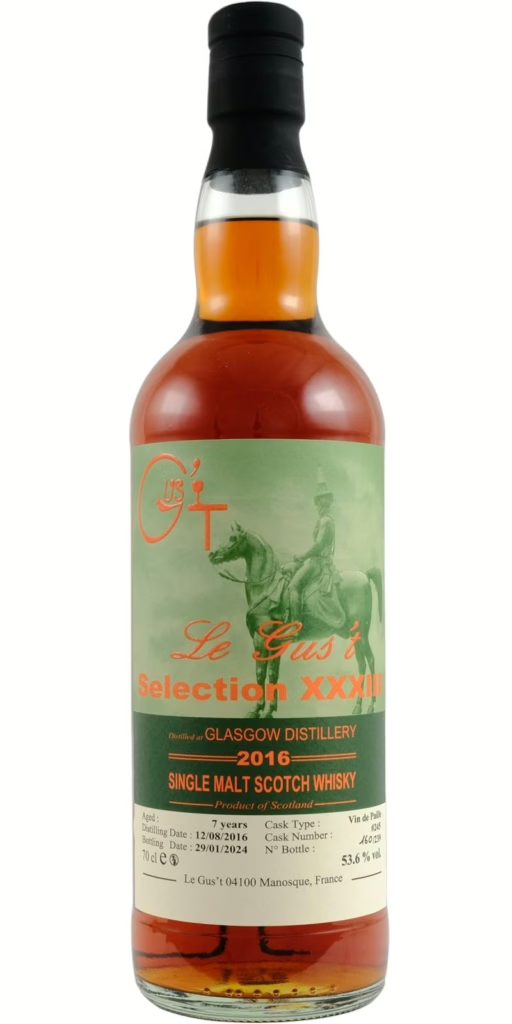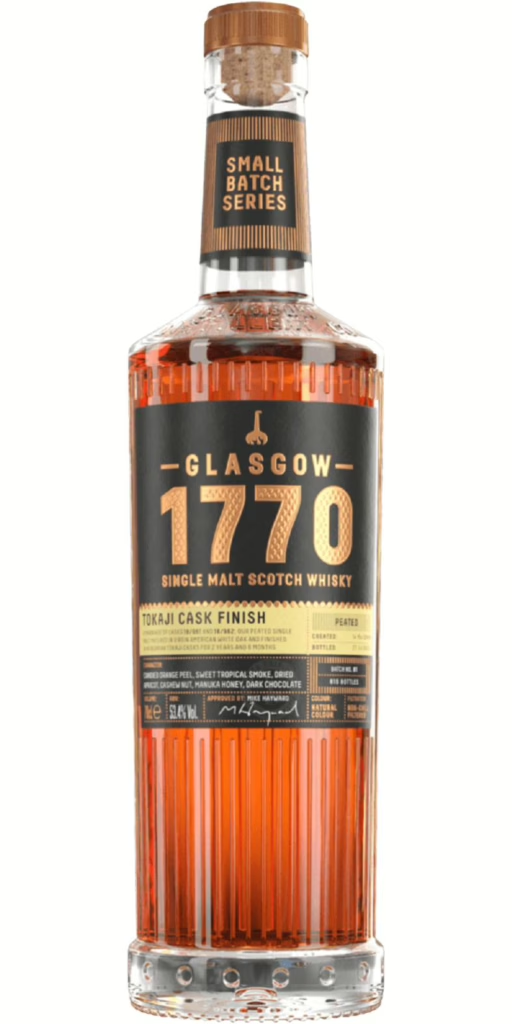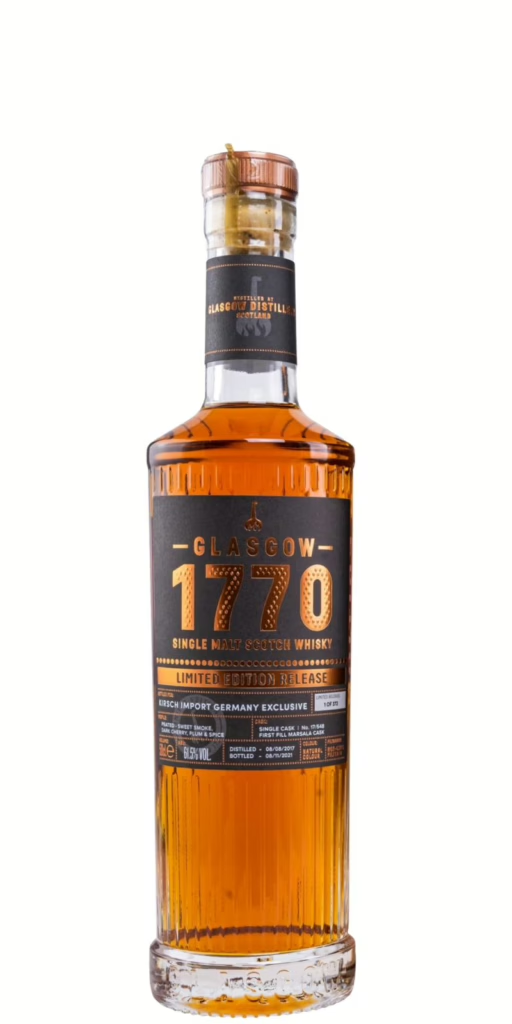Until now we had only reviewed just one Glasgow Distillery whisky, and one that wasn’t official nor a single malt, but a single grain bottled by the Scotch Malt Whisky Society. But since its launch (or relaunch, as we’ll see below), the distillery has gained a deserved following and love from many whisky fans, as they continue releasing good and reasonably priced whisky, even a few years ago, moving to 50 cl to 70 cl bottles without changing the price. It’s time we take a closer look, with three single malts, two official bottlings and one indy, with the Glasgow 1770 Tokaji and Marsala cask finish, and a Vin de Paille cask bottled by Le Gus’t, who has not disappointed us so far.
Glasgow Distillery
Glasgow Distillery operates in Hillington, just outside Glasgow, Scotland. Liam Hughes and Mike Hayward founded it in 2012 to bring back the city’s tradition of making spirits. Before this, Glasgow hadn’t had an active distillery since 1902. The new distillery takes its name from the original Glasgow Distillery Company, which started in 1770 and played an important role in the city’s whisky history.
The distillery began producing spirits in March 2015. It makes a variety of drinks, including whisky, gin, and rum. Their whisky range includes unpeated, peated, and triple-distilled versions, showing different styles and techniques. They also produce Makar Gin, the first legal gin made in Glasgow, and Banditti Club Rum.
Glasgow Distillery focuses on making quality spirits and experimenting with different cask finishes. The team has increased production to meet demand, now making up to 440,000 litres of whisky each year.
Glasgow Distillery 2016 Vin de Paille LeGus’t Selection XXXIII (2024) Review
Let’s begin with the independent bottling for a change: a Glasgow Distillery single malt distilled in 2016, matured in an ex-Vin de Paille cask from Fumey-Chatelain, and bottled by the French bottler Le Gus’t. Fumey-Chatelain, a winemaker in Jura, produces Vin de Paille, or straw wine, a sweet wine made from Chardonnay and Savagnin grapes. The grapes dry off the vine in their attics for approximately three months. Following this, they undergo slow fermentation and ageing in wooden barrels for three years.
Returning to the Glasgow Distillery whisky, it was distilled on 12 August 2016, then transferred into ex-Vin de Paille cask #245 before bottling on 29 January 2024. The cask yielded 239 bottles at 53.6% ABV, without chill filtration or added colouring. The initial retail price was less than €70, but this release has now sold out.

Colour:
Mahogany.
Nose:
Neat: The nose offers good intensity and is slightly musty and sulphury, with notes of mushrooms and undergrowth. It presents some walnut wine, goji berries, and decaying autumn leaves, along with a touch of acidity that is neither tart nor sour.
With water: The mustiness fades, giving way to marzipan sweetness, candied oranges, and more nuts.
Palate:
Neat: It has a thick, chewy mouthfeel with some astringency. An initial burst of spices includes walnut and sesame oils, metallic acidity, and black truffle. Flavours of cherries in liqueur and chocolate reminiscent of Mon Chéri chocolates emerge, accompanied by pepper, chilli, and turmeric. A light sulphur note is present but well integrated.
With water: The palate becomes fruitier, with hints of vin jaune, but it remains largely unchanged.
Finish:
The finish is long, featuring cherry tartness, smoked plum pie, blood oranges, and a pleasant lingering warmth.
Comments:
This nose is certainly uncommon and not universally appealing, but it is quite interesting, albeit somewhat divisive. The palate builds on this uniqueness and continues in the same vein, introducing oils and truffle with an immense mouthfeel. It is distinctly different and endearing, making it very good, although it may not appeal to everyone.
Rating: 7/10
Glasgow Distillery 1770 2018 Peated Tokaji Cask Finish (2023) Review
Next, we have a peated official bottling from their Small Batch Series. This Glasgow Tokaji Cask Finish was distilled on 14 March 2018 and bottled five years later on 27 July 2023. It matured in virgin oak before finishing in Tokaji wine casks #18/961 and #18/962. This small batch yielded 615 bottles (700 ml) at 53.4% ABV, without chill filtration and with natural colour. A few bottles remain, but Brühler Whiskyhaus in Germany still lists it for slightly under €90.

Colour:
Russet.
Nose:
Neat: The nose offers considerable intensity, with a slightly dirty peat smoke that stands out immediately. It presents red berries, plums, grapes beginning to ferment, and hints of overripe tropical fruits along with a touch of Campbeltown funk. Notes of almonds, orange zest, and burning wood are also present.
With water: The smoke becomes drier, but the other elements seem to recede into the background.
Palate:
Neat: The mouthfeel is not as thick as the Le Gus‘’’t cask, but it remains viscous, slightly more drying, and creamier. Flavours of sweetish Roquefort blue cheese, red berries, pepper, and wood spices emerge, with the contribution of virgin oak evident but not excessive. There are also notes of umami, a hint of rubber, charred onions, and red peppers.
With water: The mouthfeel appears to become even more drying, and the palate turns more peppery and even salty. In my opinion, water tends to highlight the virgin oak, and it does so again here.
Finish:
The astringency significantly dries the gums, leading to a long finish with chocolate, wood, chalk, lemon balm, and smoke.
Comments:
This young peated Glasgow Tokaji Cask Finish is superb. The nose and palate are intense, featuring a slightly dirty smoke and a touch of funk, along with an immense mouthfeel and a hint of umami. It is truly excellent.
Rating: 7.5/10
Glasgow Distillery 1770 2017 Marsala Single Cask (2021) Review
We end this session with another peated official bottling: a Glasgow Distillery Marsala Single Cask bottled for Kirsch Import. The Glasgow Distillery distilled this single malt on 8 August 2017 and matured it in an ex-Marsala cask #17/548 before bottling it on 8 November 2021 at four years of age. The cask yielded 372 bottles at 61.5% ABV, although at that time, Glasgow was still using 500 ml bottles. It remains available in several German shops for just under €80.

Colour:
Burnished.
Nose:
Neat: The nose presents a nice fruity aroma, with alcohol clearly noticeable. Pine needles burn, creating a light smoke. On the nose, it seems less peaty than the Tokaji variant. Hints of orchard fruits are present but a bit indistinct, possibly apricots and pears, along with some freshly squeezed orange juice.
With water: It becomes slightly sweeter, with notes of almond oil, apples, apricots, and a floral touch.
Palate:
Neat: Initially, the mouthfeel seems thinner than the previous two, but it suddenly thickens and becomes very drying. The palate is quite intense, with a lot of smoke and pepper, along with chocolate and baking spices. Its youth is evident, but it is enjoyable. Flavours of blood orange, hazelnuts, and salted almonds emerge. Let‘’’s see how it changes with dilution.
With water: After reduction, the mouthfeel remains viscous and syrupy but is slightly less drying. Notes of oranges reappear, along with lemon, pineapple in syrup, and still quite a bit of spice.
Finish:
It offers a touch of smoke, apricots, and plum fruit jelly, along with dark chocolate and a hint of caramel. The dryness on the gums lingers persistently.
Comments:
Its youth is evident, but the intensity on both the nose and palate makes it enjoyable once again. At 61.5% ABV, it is certainly not an everyday dram. However, despite its young age, it is truly interesting and endearing. It may lack a bit of balance, but it is far more intriguing than any 12-year-old core range single malt from a major distillery, for instance!